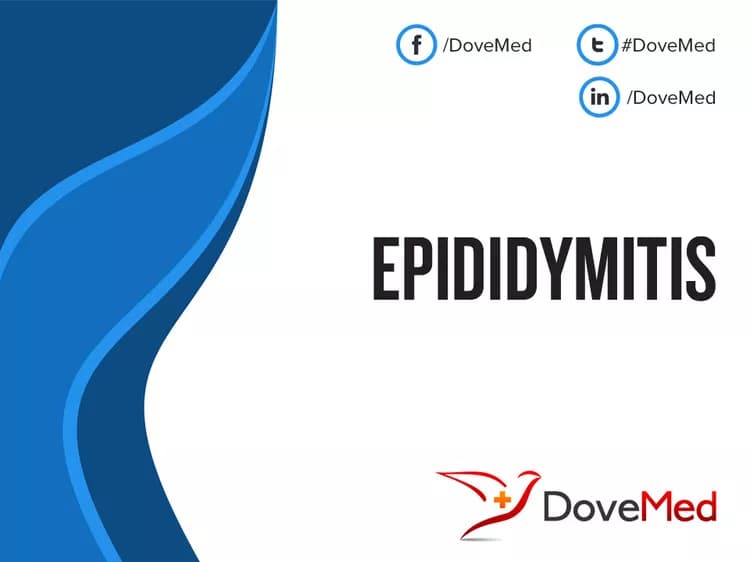
Epididymitis
What are the other Names for this Condition? (Also known as/Synonyms)
- Inflammation of the Epididymis
What is Epididymitis? (Definition/Background Information)
- Epididymitis is the inflammation of the epididymis, a coiled tube at the back of the testicle that stores mature sperm. This condition exclusively affects males
- Sexually transmitted infections, urinary tract infections, and prostate enlargement are risk factors for Epididymitis. Presence of infections in the genital area and use of amiodarone drug can cause Epididymitis
- Fever, chills, painful urination, and pain in the testicular area are symptoms of Epididymitis. The condition may become chronic, if it is left untreated and can reduce fertility
- The treatment for Epididymitis consists of a course of antibiotics and proper supportive therapy. With suitable treatment, the prognosis of Epididymitis is good
Who gets Epididymitis? (Age and Sex Distribution)
- Only males are prone to Epididymitis. It is most common between the ages 19-35 years, however other age groups can also be involved
- Males of all races and ethnicities are susceptible to Epididymitis
What are the Risk Factors for Epididymitis? (Predisposing Factors)
The risk factors for Epididymitis may include:
- Having unprotected sex with a partner who has a sexually-transmitted infection, increases the risk for developing Epididymitis
- A history of urinary tract infection and medical procedures involving the urinary tract can also increase the risk
- Uncircumcised penis and prostate enlargement are other factors that can increase one’s risk
It is important to note that having a risk factor does not mean that one will get the condition. A risk factor increases ones chances of getting a condition compared to an individual without the risk factors. Some risk factors are more important than others.
Also, not having a risk factor does not mean that an individual will not get the condition. It is always important to discuss the effect of risk factors with your healthcare provider.
What are the Causes of Epididymitis? (Etiology)
There are several causes of Epididymitis and these include the following:
- Epididymitis is most commonly caused by an infection. Often, the infection originates in the bladder, prostate, or urethra. Gonorrhea and Chlamydia are bacterium that commonly cause Epididymitis in young, heterosexual males
- Mycobacterium tuberculosis, another bacterium, may cause Epididymitis
- Epididymitis can also be caused by amiodarone, a medication intended to prevent abnormal heart rhythms
What are the Signs and Symptoms of Epididymitis?
The signs and symptoms of Epididymitis may include:
- Fever and chills
- Feeling of heaviness in the testicle area, which also becomes sensitive to pressure
- Blood in semen
- Pelvic pain
- Painful or burning sensation while urinating
- Painful scrotal swelling
How is Epididymitis Diagnosed?
A diagnosis of Epididymitis may involve the following steps:
- A complete medical history and a thorough physical examination; during the physical exam, a red, tender lump on the affected side of the scrotum may be noted
- Screening for sexually transmitted disease
- Complete blood count (CBC) test to rule out an infection
- Urine and blood tests are undertaken to detect abnormalities
- Ultrasound scan of the abdomen and testes
Many clinical conditions may have similar signs and symptoms. Your healthcare provider may perform additional tests to rule out other clinical conditions to arrive at a definitive diagnosis.
What are possible Complications of Epididymitis?
There are several complications associated with Epididymitis. These include:
- If it is left untreated, Epididymitis may become a chronic condition
- Abscess may form in the scrotum
- If the condition spreads to the testicle, epididymo-orchitis can develop
- In rare cases, reduced sperm production combined with reduced fertility has been noted
How is Epididymitis Treated?
The following are treatment measures for Epididymitis:
- Cases that are caused by infection are treated with a 2 week course of antibiotics
- Certain sexually transmitted infections require specific types of prescription antibiotics
- Pain-relievers and anti-inflammatory medicines are prescribed to reduce swelling and discomfort
How can Epididymitis be Prevented?
Epididymitis may be prevented through the following considerations:
- Since the condition is generally caused by sexually transmission, it can be prevented by practicing safe sex an avoiding multiple partners
- Antibiotics may be prescribed prior to certain surgeries, which are known to increase the risk of Epididymitis
What is the Prognosis of Epididymitis? (Outcomes/Resolutions)
- The prognosis for Epididymitis is typically good. The condition usually gets better with antibiotic treatment
- In most cases, no long-term reproductive or sexual dysfunction is observed
Additional and Relevant Useful Information for Epididymitis:
The following article link will help you understand other conditions relating to men’s health:
Related Articles
Test Your Knowledge
Asked by users
Related Centers
Related Specialties
Related Physicians
Related Procedures
Related Resources
Join DoveHubs
and connect with fellow professionals

0 Comments
Please log in to post a comment.